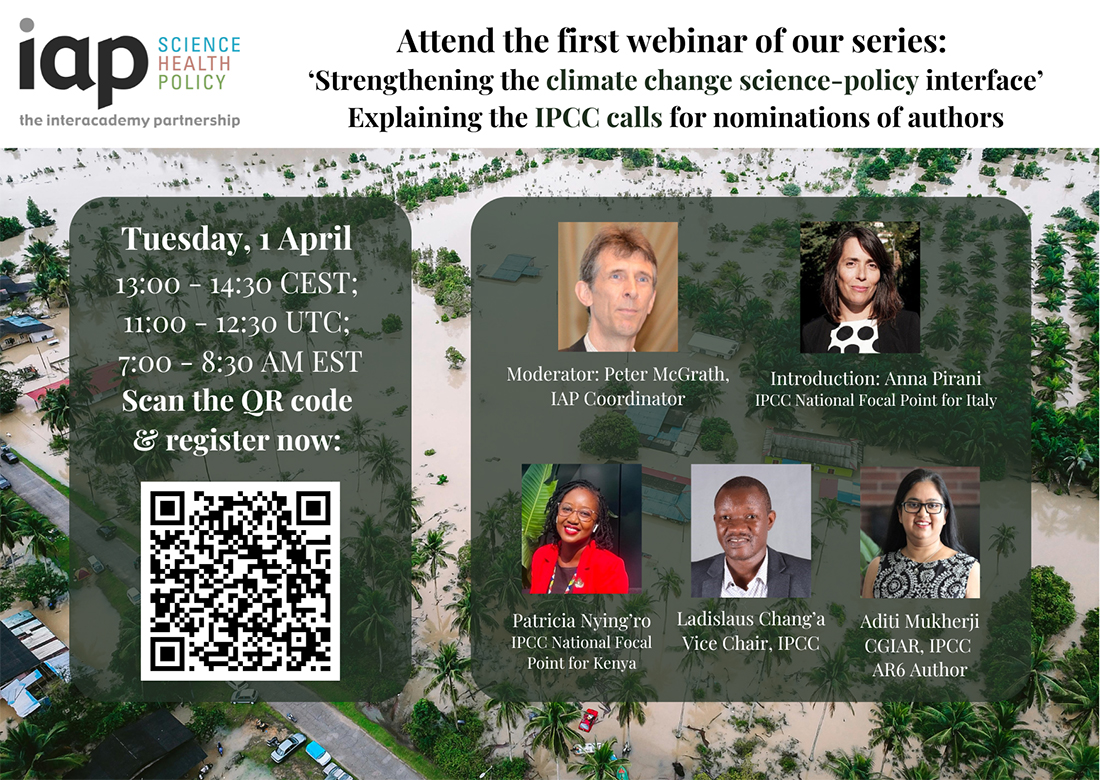IAP Webinar
1 April 2025, h. 13:00 – 14.30 CEST
Register here | More information

This webinar, the first in a planned series in collaboration with the IPCC Focal Point for Italy, hosted by CMCC, aims to convene climate change experts and other interested parties (e.g. representatives of academies of science). It will focus on the process of IPCC calls for nominations of authorsand how academies and experts can engage.
The introductory webinar will explain this new IAP initiative and the key steps in the preparation of an IPCC report. The webinar takes place in conjunction with the latest IPCC call for nominations. The aim is to provide participants with all the information needed to apply as an author or, if you are a representative of a national academy, to act as a catalyst at the national level. The overarching aim of this series of webinars is to meet the need of increasing the representation of experts from the Global South in the IPCC science-policy interface. The event will be recorded and summarized on the IAP website (see past webinars).
Background
The Intergovernmental Panel on Climate Change (IPCC) provides regular assessments of the scientific basis of climate change, its impacts, and future risks, as well as adaptation and mitigation options. The IPCC Assessment Reports provide authoritative information for governments and policymakers. While each IPCC report may include contributions from hundreds of authors, contributors and insights from developing countries are consistently underrepresented. This raises issues related to the diversity of inputs that are critical for policy-relevant assessments. There are also ethical aspects, as the risks and consequences of the climate crisis are disproportionately affecting the most vulnerable, those who typically live in countries that have historically emitted the least amount of greenhouse gases. Thus, there is a critical need to increase the breadth of insights and knowledge contributed to IPCC reports by experts from low- and middle income countries.
Agenda
- Explanation of the new IAP initiative in collaboration with the IPCC National Focal Point for Italy
- Explanation of the key steps in the preparation of an IPCC report
- Views from the IPCC and authors who have previously contributed to IPCC reports.
- Presentation of the latest IPCC call for authors
- Discussion / Q&A
Read and download all the information about the webinar here.
The webinar is organized as part of the IAP Webinar Series. Inquiries should be sent to Peter McGrath [email protected] or IAP Secretariat at [email protected].
Speakers
Peter McGrath has acted as the Coordinator of the InterAcademy Partnership secretariat In Trieste, Italy, since 2013. He has a background in the biosciences, with a PhD from the University of Leeds, UK. His ten-year research career focused on the transmission of viruses by insects was spent between labs in the UK and USA. He joined The World Academy of Sciences (UNESC-TWAS) in 2003, where he became responsible for overseeing TWAS’ capacity building programmes for science in Low- and Middle-Income Countries. From 2011, he was also tasked with building the TWAS science diplomacy programme and maintained his activity in this activity when transferring to IAP in 2013.
Anna Pirani, IPCC National Focal Point for Italy, Senior Scientist and Director of the Programme on Predicting Socio-Economic Outcomes, Euro-Mediterranean Center on Climate Change (CMCC). Pirani is working on climate risk assessment considering multi-hazard risk, trans-boundary and cascading risks, possible climate futures, and the science-policy interface. She provides scientific support to the Italian ministry on the environment and energy security (MASE) for climate change negotiations at UNFCCC, the G20 and the G7.
Ladislaus Chang’a, Vice Chair, Intergovernmental Panel For Climate Change (IPCC); Acting Director General of the Tanzania Meteorological Authority. Chang’a is a meteorologist, working on climate and meteorology since 1995 and serves as part-time lecturer at the University of Dar-es-Salaam, Tanzania, where he supervises MSc and PhD students. He also facilitates negotiations at the UNFCCC.
Patricia Nying’uro, IPCC National Focal Point for Kenya, Climate Scientist & Principal Meteorologist at the Kenya Meteorological Department and Scientific staff at the Oescheger Center for Climate Change Research, Bern, Switzerland. Patricia Nying’uro works at the science-policy-practice interface translating science for policy and practice. Her current research focuses on enhancing ethics in scientific research focusing on adaptation research as well as causal network modelling.
Aditi Mukherji, Platform Director, Climate Change and Adaptation, Impact Action Platform, Consultative Group for International Agricultural Research (CGIAR). Aditi Mukherji has a PhD from the University of Cambridge, UK. Her scientific expertise lies in the areas of groundwater governance, energy-irrigation nexus, climate change adaptation and community management of water resources. She led research at the International Water Management Institute (IWMI) and International Centre for Integrated Mountain Development (ICIMOD). She has contributed to IPCC reports, and received the Norman Borlaug Field Award.

